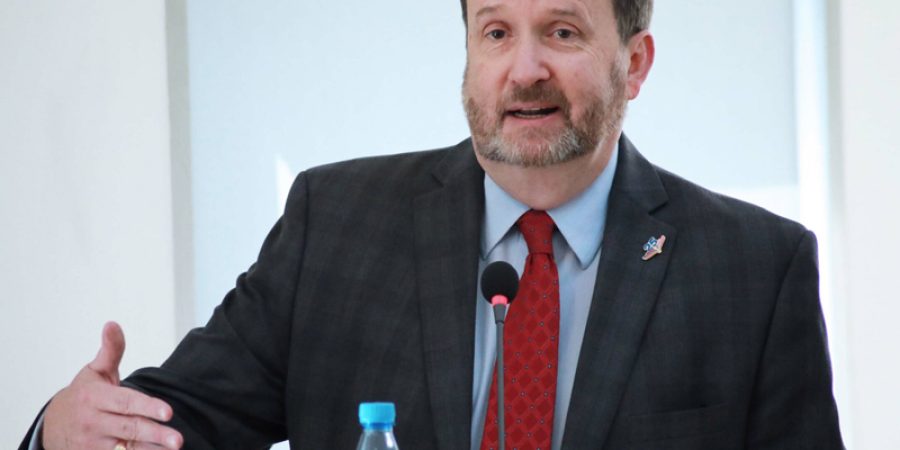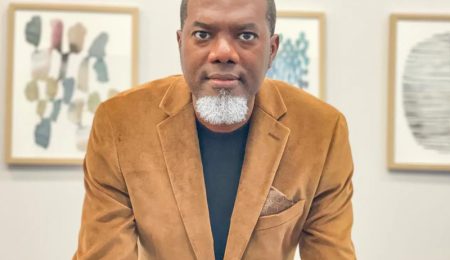The United States government said on Thursday, that the country’s trade with Nigeria reached $13 billion in 2024, emerging as its second-largest trading partner on the African continent.
It also lauded the Nigerian government for the recent wave of economic and fiscal reforms, describing them as critical steps toward improving the country’s investment climate and attracting foreign participation, especially from American businesses.
Speaking during a fireside chat at the Lagos Business School (LBS) in Lagos, themed: “Toward a Robust US-Nigeria Commercial and Investment Partnership,” the country’s Ambassador to Nigeria, Richard Mills, noted that the US will increasingly move from development aid to private sector-led investment in Nigeria and sub-Saharan Africa to deepen commercial engagement with the region.
“Nigeria is already the United States’ second-largest trading partner in Africa, with two-way trade in goods and services totaling nearly $13 billion in 2024. In terms of investment, the United States remains one of Nigeria’s leading foreign investors, with foreign direct investment reaching $6.5 billion in 2023, a 5.5 per cent increase from 2022,” Mills added.
He lauded the current leadership in Nigeria, both at the federal level and state levels, for listening and acting when issues are raised. “ (They) listen to us when we come in and say, ‘This has been identified to us as a serious issue for US business,’ and I think that’s really important to put out that we do have some listening, really listening, happening,” Mills stated.
He acknowledged that while the economic reforms have come with challenges for Nigerians, they offer long-term potential for inclusive growth.
“We have seen some significant economic reforms in the last several years that have really improved the macroeconomic possibilities here. I know they’ve been painful for a lot of Nigerians, but I do believe our assessment is that they will begin, hopefully, to have these green shoots grow into even more opportunities,” he stressed.
Mills pointed to the ongoing tax reform process as particularly encouraging, referencing feedback from American firms grappling with Nigeria’s complex tax environment.
“One US business told me that their operations in Nigeria paid 67 different federal taxes including a tax on wheelbarrows which is some leftover from a different age. So, the tax reform bill is very important,” he added.
Despite the progress, the ambassador noted that structural barriers, particularly in power infrastructure remain a major deterrent for US businesses, especially in energy-intensive and tech-driven sectors.
He noted: “The government and private sector need to take on the energy question. Electric power distribution and transmission capacity is still a serious blockage for a lot of US firms here especially in the tech sector, which is very interested in taking advantage of Lagos and the country’s incredible talent in the tech field.”
Speaking on a trade-driven partnership, rather than traditional aid flows, he said that Nigeria, one of Africa’s largest economies with huge economic potential, is ready to enter a new phase of vibrant private sector-led growth.
He said: “Over the last few decades, the United States has invested billions of dollars in Nigeria’s health, Nigeria’s education and agricultural sectors, I believe, saving lives and also creating new economic opportunities on the ground.
“However, we have reached what President Trump likes to call an inflection point. Now is the time for us both to build on the strength of these aid investments and for Nigeria, one of Africa’s largest economies with huge economic potential, to enter a new phase of vibrant private sector-led growth.”
He stated that the US was making a shift from aid to trade, stressing that the country was interested in engaging African nations not as aid recipients, but as capable commercial partners.
“For us, as our chief of African Affairs, Ambassador Latrell, said, going forward, we will continue to invest in development, but we will do so through expanding trade and private investment, because it is the private sector, not assistance, ultimately, that drives the final stage of economic growth,” Mills said.
Mills noted that under his mandate as US ambassador, the key priority would be to strengthen trade and investment ties between the two countries. As part of this effort, he highlighted the Commercial and Investment Partnership (CIP) agreement signed in 2023 between the US Department of Commerce and Nigeria’s Ministry of Industry, Trade and Investment.
The five-year memorandum of understanding, he said, prioritises three key sectors: agriculture, the digital economy, and infrastructure.
According to Mills, “Nigeria is only one of five African nations with which the US has signed the CIP agreement. We are officially launching the partnership discussions later this month.”
He explained that working groups would be formed under the CIP framework, made up of US and Nigerian private sector representatives, to tackle regulatory and non-tariff barriers that have long impeded bilateral trade and investment.
Emmanuel Addeh and Nume Ekeghe
Follow us on:


